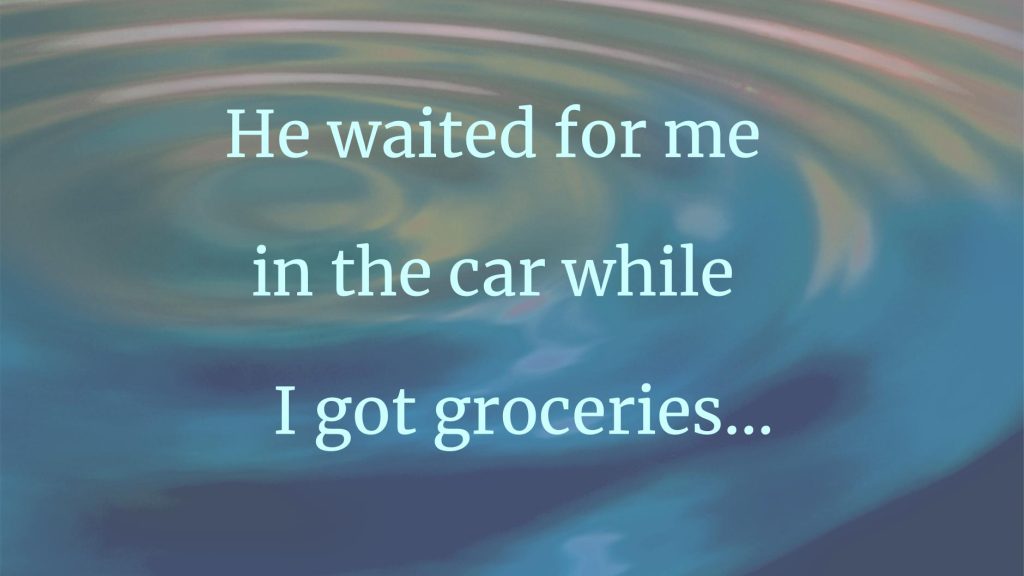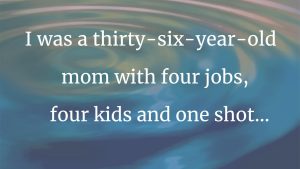Time fractured when my first husband died.
There was a before, which no longer existed, and an after, which was unimaginable.
In between, the thinnest–unfathomably thin–line, was the today. The today meant putting one foot in front of the other. One today led to the next today. And finally the year was over.
But the before was lost, buried in a protective amnestic cocoon. Don’t go there, my mind said. Move along–there’s nothing to see here.
And I obeyed.
The year, 1971, had begun badly. In 1969, unable to gain admission to medical school, I had settled down into a job as a research engineer at GT&E’s Electronic Research Lab, a developmental think tank buried amidst a crowd of other similar labs, out on route 128—Boston’s ring road. I had just gotten my first raise when management called all of us into a big empty room. We stood around the walls and learned that they were closing the facility and had already sold the building. We would get two weeks’ severance and assistance with placement.
It was the start of a major recession in the electronics/defense-contracting industry clustered around route 128. There were no jobs to be had. Massachusetts had generous unemployment benefits, and Chris, my young husband, had a job. Chris wanted me to apply to medical school again, but I’d been turned down twice and was loath to try again.
By May, I had been out of work more than six months. One day, Chris and I drove to his mother’s house. He waited for me in the car while I got groceries, and during that time he suffered a major stroke. I came back to the car in the rain, arms full of bags, and he flailed futilely toward the door lock. His smile was crooked. He made a few unformed sounds. In those few minutes, he had lost language and the use of half of his body.
He was admitted to one of the finest hospitals in the country, under the care of a stroke specialist who would later describe this kind of stroke, which occurs in young adults like Chris. Over and over again the doctors told me there was nothing they could do. A week later, he was gone.
He had been so bright, so much smarter than me. I felt an incandescent desire to fulfill his promise. I resolved to go to medical school.
As I set out upon that path, I fended off threats. Our landlord wanted our winterized cottage for his married daughter, but ultimately honored our lease until I was ready to move. My parents had assumed that I would move back into their home. Help came from unexpected places, and I got a job working in a medical lab and applied to medical school for the third time. This time I got in—accepted at my first choice.
I burned all the other schools’ catalogs and paperwork in our fireplace. Had life required a blood sacrifice to grant my dearest wish?
Night after night, sitting alone in our tiny living room, I watched my right hand clench over and over again as if to crush the coffee mug it was cradling. Finally, one night, I let it clench as hard as it wanted to—and discovered that I was not strong enough to break the mug.
For many years, the before remained lost, except for a vivid memory of Chris’s hospitalization and death. But the good days before that were mere fragmentary memories that surfaced from time to time. An image of sleeping on a beach and awakening after midnight to see a skunk walk by my sleeping bag puzzled me for years, until I remembered a trip that Chris and I had taken to Nantucket.
These weren’t the kind of disturbing flashbacks that people describe with PTSD. It was as if the before wanted me to remember the good times, but only as much of them as I could bear. And I did start to remember the good times. That trip to Nantucket—we had flown there on a whim to see a total solar eclipse. There were no motel rooms to be had, so we slept on the beach. I eventually recovered the entire memory of the trip, but it took years. It was like patiently unsnarling a skein of yarn, undoing tangle after tangle.
Just as the before started to return, the after expanded to become my whole life. Today expanded and became simply a step in the after. In medical school, I chose surgery as my specialty, never wanting to have to tell a patient (or a family) that there was nothing I could do. Even so, sometimes a clinical situation would pull me back into my personal maelstrom.
I fell in love with a med-school classmate. It was like being struck by lightning again. We married. Dreams expressed my survivor’s guilt in increasingly bizarre images. Years passed. I stitched together more and more of the before with a warm sense of nostalgia, but devoted virtually all of my energy to today and after.
It has been more than fifty years now. May comes, year after year, with a trace of melancholy and regret for a promising life cut short. The dreams have stopped. I am so aware of the uncertainty, the fragility, of life. I continue to live, in the time inexplicably granted to me, in the today and the after—which have morphed into the now and the future.









12 thoughts on “Time Splintered”
Beautiful and inspiring.
Wow!
Powerful!
Thank you for sharing. My father-in-law lost his wife (my mother-in-law) shortly before my wife and I married. Though different situation than yours, he, too, found love again and lives in the today and after. However, he still reminisces about the before. We, as outsiders, will never know what it’s like to have suffered such a loss and gained such another love. Thank you for sharing and helping us understand, albeit incompletely, your loss and love as well as that of my father-in-law.
Beautiful writing. I am hateful you shared this with Pulse readers.
Evocative tribute to love for your first husband through spooling and unspooling of time. Please keep writing and sharing as you continue your healing path for self and others.
Thank you- I am living before and after and today as well. I lost my husband 1.5 years ago and it feels like yesterday- sometimes I feel I have moved to after, able to laugh again, only to be thrown back into before-
Thank you for sharing your loss and how
You were able to move on with life. It’s far from easy and you give hope to many of us who are presently still recovering
From a loss of a loved one three years
Ago.God bless you.
This story is a blessing and a gift. Thank you.
Thank you for sharing your extraordinary story. I lost a child to suicide not long ago and am still trying to make sense of before and after. Your story is comforting.
Wow. Spectacular evocation of the struggle.
Thank you for this moving and beautiful story.
I am so happy for you that you found happiness after terrible tragedy. And obviously, a very successful career. Best wishes for your journey.
This is absolutely lovely. Thank you for sharing an extraordinary before-and-after circle-of-life story. Thank you